|
|
|
Sort Order |
|
|
|
Items / Page
|
|
|
|
|
|
|
| Srl | Item |
| 1 |
ID:
039244
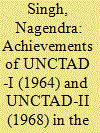

|
|
|
|
|
| Publication |
New Delhi, S Chand and Co, 1969.
|
| Description |
xx, 576p.hbk
|
|
|
|
|
|
|
|
|
|
|
|
Copies: C:1/I:0,R:1,Q:0
Circulation
| Accession# | Call# | Current Location | Status | Policy | Location |
| 001863 | 382.9/NAG 001863 | Main | On Shelf | Reference books | |
|
|
|
|
| 2 |
ID:
098626
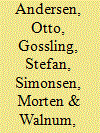

|
|
|
|
|
| Publication |
2010.
|
| Summary/Abstract |
Emissions of greenhouse gases in many European countries are declining, and the European Union (EU) believes it is on track in achieving emission reductions as agreed upon in the Kyoto Agreement and the EU's more ambitious post-Kyoto climate policy. However, a number of recent publications indicate that emission reductions may also have been achieved because production has been shifted to other countries, and in particular China. If a consumption perspective is applied, emissions in industrialized countries are substantially higher, and may not have declined at all. Significantly, emissions from transports are omitted in consumption-based calculations. As all trade involves transport, mostly by cargo ship, but also by air, transports add considerably to overall emissions growth incurred in production shifts. Consequently, this article studies the role of transports in creating emissions of CO2, based on the example of exports from China. Results are discussed with regard to their implications for global emission reductions and post-Kyoto negotiations.
|
|
|
|
|
|
|
|
|
|
|
|
|
|
|
|
| 3 |
ID:
109955


|
|
|
|
|
| Publication |
2012.
|
| Summary/Abstract |
As the world becomes increasingly globalized, interruptions to international trade cannot be permitted. Piracy off the coast of Somalia has hampered international trade in the region and poses significant risks to the sailors required to navigate those waters. Over the past three years the global community has attempted, through a number of different naval tactics, to stop these acts of piracy; however, these tactics have proven ineffective. This article looks at historical precedence and military theory to support the concept of using convoys to protect the thousands of cargo vessels traveling round the Horn of Africa every year. This tactic will greatly decrease the number of successful pirate attacks and save countless lives in the process.
|
|
|
|
|
|
|
|
|
|
|
|
|
|
|
|
| 4 |
ID:
071601
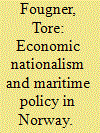

|
|
|
|
|
| Publication |
2006.
|
| Summary/Abstract |
While celebrating recent efforts to redefine 'economic nationalism' by placing nationalism and national identity - rather than the state or illiberal economic policies - at its core, this article takes issue with the tendency to provide an unnecessarily narrow specification of a new research agenda on economic nationalism. More specifically, it argues that the agenda should concern not merely how national identities and nationalism influence economic policies and processes, but also how the latter can influence the former. An argument is also made for this twoway relationship to be conceived in constitutive terms, and a study of the efforts to develop a maritime policy in Norway in the mid-1990s is presented to show the usefulness of this reformulated research agenda on economic nationalism.
|
|
|
|
|
|
|
|
|
|
|
|
|
|
|
|
| 5 |
ID:
043281
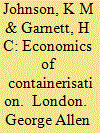

|
|
|
|
|
| Publication |
London, George Allen and Unwin Ltd., 1971.
|
| Description |
216p.Hbk
|
| Series |
University of Glasgow social and eonomic studies
|
| Standard Number |
0043800092
|
|
|
|
|
|
|
|
|
|
|
|
Copies: C:1/I:0,R:0,Q:0
Circulation
| Accession# | Call# | Current Location | Status | Policy | Location |
| 006890 | 688.8/JOH 006890 | Main | On Shelf | General | |
|
|
|
|
| 6 |
ID:
091516
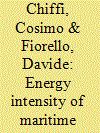

|
|
|
|
|
| Publication |
2009.
|
| Summary/Abstract |
This paper describes the energy consumption performance of sea-going ships engaged in the EU27 seaborne trades based on data and parameters resulting from the EX-TREMIS (EXploring non road TRansport EMISsions in Europe) database. EX-TREMIS is a comprehensive database of fleet and transport activity data, specific energy consumption, emission factors and total emissions from rail, maritime and air transport in the European Union. The EX-TREMIS maritime model derives from a mixture of top-down and bottom-up approaches for estimating pollutant emissions from shipping activities. The model did not use direct observations of actual trips, but empirically derived the number of equivalent-ships. Cargo type shipments were linked to seven ship type categories for which a further segmentation by ship size (three length classes), type and age of the main engine and type of fuel was applied.
|
|
|
|
|
|
|
|
|
|
|
|
|
|
|
|
| 7 |
ID:
112327


|
|
|
|
|
| Publication |
2012.
|
| Summary/Abstract |
The goal of this study is to evaluate the life cycle performance of two alternative pathways to biofuels in the shipping industry: the 'diesel route' and the 'gas route'. The diesel route comprises of a shift from heavy fuel oil to marine gas oil and then a gradual shift to biodiesel, whereas the gas route comprises of a shift to liquefied natural gas and then a gradual shift to liquefied biogas. The two routes are assessed in a case study for the ferry traffic between the Swedish mainland and the island Gotland. Life cycle assessment (LCA) is used to evaluate the environmental performance with the functional unit chosen to be one year of ro-pax ferry service, including both passenger and goods transportation. The gas route is indicated to have better overall environmental performance than the diesel route. Furthermore, use of biofuels is illustrated as one possible measure to decrease the global warming impact from shipping, but to the expense of greater environmental impact for some other impact categories. As an example, the global warming potential (GWP100) was shown to decrease with the use of biofuels in this study, while the eutrophication potential and the primary energy use increased.
|
|
|
|
|
|
|
|
|
|
|
|
|
|
|
|
| 8 |
ID:
184787


|
|
|
|
|
| Summary/Abstract |
In 1940, the Indian population resident in Japan was estimated at over 500. With the potential for war with Japan increasing, the British embassy in Tokyo advised locally resident British subjects to leave in October 1940 and again in February 1941. However, some, including a number of Indians, chose not to leave. This article considers the evacuation of the Indian population from Japan before December 1941 as well as those who departed as part of the wartime Anglo-Japanese Civilian Exchange. In doing so, it discusses the use of the SS Anhui to evacuate British subjects and also the lack of safe conduct for the City of Paris, which carried the Indian repatriates back to Bombay.
|
|
|
|
|
|
|
|
|
|
|
|
|
|
|
|
| 9 |
ID:
116745
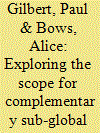

|
|
|
|
|
| Publication |
2012.
|
| Summary/Abstract |
For a high probability of avoiding dangerous interference with the climate system, all sectors must decarbonise over coming decades. Although shipping is an energy efficient transport mode, its emissions continue to grow. Compounding this, the sector's complexity, exclusion from emission inventories and slow progress towards a mitigation strategy, limit drivers towards meaningful change. Whilst there remains a preference within the industry for global mitigation policies, the urgency of required emission cuts necessitates exploration of complimentary sub-global measures. The debate surrounding such measures tends to focus on apportioning global shipping emissions to nations. To explore the policy implications of apportionment, the UK is used in this paper to illustrate how available apportionment regimes produce a wide range of emission estimates. Moreover, in the absence of transparent fuel consumption and freight data, they have limited sensitivity, rendering them currently obsolete for monitoring purposes. Nations, regions and organisations influence shipping, particularly in relation to operations, yet debate surrounding apportionment has arguably delayed consideration of sub-global polices and indicators. This paper makes a case for putting the apportionment debate aside in the short-term to open out the full span of options, consider influence over aspects of the shipping system, and how to monitor success.
|
|
|
|
|
|
|
|
|
|
|
|
|
|
|
|
| 10 |
ID:
192518
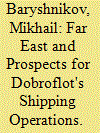

|
|
|
|
|
| Summary/Abstract |
The author examines the role of Dobrovolny Flot (lit. "Volunteer Fleet," hereinafter Dobroflot or the Fleet) in the expansion of shipping traffic between the European and Far Eastern regions of Russia between 1891 and 1914. This paper presents the first ever comprehensive assessment of the effectiveness of this state-controlled shipping enterprise and contributes to the evaluation of commercial performance indicators of maritime freight and passenger transportation in the Russian Empire. An empirical analysis reveals a firm relationship between government support and the stability of coastal shipping operations. Additionally, the author finds that growth of the state-owned company's profitability came mainly from an increase in profits from the transportation of commercial cargoes. Using archival documents, corporate statistics, and records of State Duma debates, the author demonstrates that attempts to increase the volume and activity of interregional transportation led to major changes in the principles of government regulation, that the reform was inspired by the desire to support cargo transportation rather than passenger traffic, that the reform was characterized by cooperation between officials and business circles, and that legislative acts (of 1892, 1902, 1912, and 1914), although flawed in some respects, nevertheless provided a basis for future public-private partnership. This conforms to conclusions that the development of the transportation business was largely caused by growing income resulting from transformations in Russia's infrastructure sector, by the government's regional innovations, and by private interests related to cross-border commercial interaction. The author's findings support arguments that government support could accelerate transformations in the shipping business and contribute to the commercial orientation of the state-owned company's activities.
|
|
|
|
|
|
|
|
|
|
|
|
|
|
|
|
| 11 |
ID:
101264
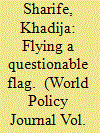

|
|
|
| 12 |
ID:
093866


|
|
|
|
|
| Publication |
2010.
|
| Summary/Abstract |
This article examines the social organisation of cocaine smuggling in Greece. Emphasis is placed on the involvement of professionals from the shipping industry and actors from the 'upper society echelons' who play a pivotal role in the transportation and importation of cocaine to Western Europe and Greece. After considering empirical evidence from a variety of sources, our findings indicate that the cocaine market in Greece is 'organised' by a system of collaborative relationships between state, business and civil society actors. It is suggested that to better understand the nature of this illegal market, further research is required to take a closer look into the economic, socio-cultural and political incentives of these actors.
|
|
|
|
|
|
|
|
|
|
|
|
|
|
|
|
| 13 |
ID:
099845
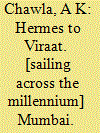

|
|
|
|
|
| Publication |
Mumbai, Commanding Officer, INS Viraat, 2009.
|
| Description |
184p.
|
| Standard Number |
9788190899703, hbk
|
|
|
|
|
|
|
|
|
|
|
|
Copies: C:1/I:0,R:0,Q:0
Circulation
| Accession# | Call# | Current Location | Status | Policy | Location |
| 055395 | 359.0216/CHA 055395 | Main | On Shelf | General | |
|
|
|
|
| 14 |
ID:
132166


|
|
|
|
|
| Publication |
2014.
|
| Summary/Abstract |
The aim of this article is to analyze the tactical behavior of Somali pirates, international naval forces, and the shipping community operating in the Gulf of Aden and the Somali Basin. To what extent has tactical behavior changed over time and can this process be understood in more theoretical terms? Our theoretical framework centers around some concepts often used in naval doctrine, discussing tactical change in terms of command and control, force, mobility, protection, intelligence, and endurance. We also evaluate this change using two tactical concepts-tactical adaptation and tactical development. The empirical data is based on statistics from the International Criminal Court-International Maritime Bureau and the EU NAVFOR Operation Atalanta, as well as interviews. We conclude that Somali piracy has unquestionably adapted their tactics to circumstances, while naval forces have increased their capacity to capture pirates and shipping to avoid pirates.
|
|
|
|
|
|
|
|
|
|
|
|
|
|
|
|
| 15 |
ID:
041440
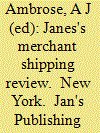

|
|
|
|
|
| Publication |
New York, Jan's Publishing Inc., 1984.
|
| Description |
175p.Hardbound
|
| Standard Number |
0710603029
|
|
|
|
|
|
|
|
|
|
|
|
Copies: C:1/I:0,R:0,Q:0
Circulation
| Accession# | Call# | Current Location | Status | Policy | Location |
| 024675 | 387.5/AMB 024675 | Main | On Shelf | General | |
|
|
|
|
| 16 |
ID:
007037
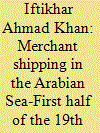

|
|
|
|
|
| Publication |
March 2000.
|
| Description |
163-173
|
|
|
|
|
|
|
|
|
|
|
|
|
|
|
|
| 17 |
ID:
079840
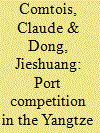

|
|
|
|
|
| Publication |
2007.
|
| Summary/Abstract |
This paper canvasses the port development of the Yangtze River Delta. Initially, we consider changes in container trade in the region since the 1990s. Competition between the ports of Ningbo and Shanghai are studied by measuring the overlapping hinterland of container distribution for Zhejiang province. We then analyse the strategies pursued by international carriers and terminal operators to secure success in this increasingly competitive environment.
|
|
|
|
|
|
|
|
|
|
|
|
|
|
|
|
| 18 |
ID:
039142
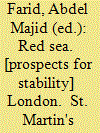

|
|
|
|
|
| Publication |
London, St. Martin's Press, Inc., 1984.
|
| Description |
173p.Hbk
|
| Standard Number |
0709905432
|
|
|
|
|
|
|
|
|
|
|
|
Copies: C:1/I:0,R:0,Q:0
Circulation
| Accession# | Call# | Current Location | Status | Policy | Location |
| 024716 | 909.0965330826/FAR 024716 | Main | On Shelf | General | |
|
|
|
|
| 19 |
ID:
160925
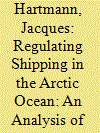

|
|
|
|
|
| Summary/Abstract |
The United Nations Convention on the Law of the Sea (LOSC) permits state parties to establish an Exclusive Economic Zone (EEZ) 200 nautical miles from their coast. Coastal states have exclusive jurisdiction over resources within the EEZ, but navigational and other high seas freedoms continue to exist. A significant number of states have, however, enacted legislation that departs from the LOSC, interfering with the navigational rights and freedoms of other states. This article analzses this development with a specific focus on the Arctic. It investigates the powers of Arctic coastal states to regulate shipping in the EEZ and thereby navigation in the Arctic Ocean. It adds to the existing literature by providing an analysis of state practice, suggesting that despite uncertainty concerning the interpretation of the LOSC Article 234 and the right to exercise legislative jurisdiction over ice-covered waters, a not insignificant number of states have claimed jurisdiction in their own EEZ beyond the rights granted in the LOSC, and are therefore not in a position to object to extensive jurisdictional claims in the Arctic.
|
|
|
|
|
|
|
|
|
|
|
|
|
|
|
|
| 20 |
ID:
125814
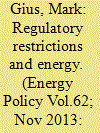

|
|
|
|
|
| Publication |
2013.
|
| Summary/Abstract |
The purpose of the present study is to estimate the effects of the Jones Act on spot gasoline prices. Although the Jones Act pertains to the domestic shipment of all types of goods, the present study will only focus on gasoline. The present study will use data obtained from the Energy Information Administration in order to determine if the price of gasoline declined during Jones Act waiver periods. Looking at daily prices, the results regarding the effects of the Jones Act on spot gasoline prices are mixed. When using a t-test, the results indicated either that there was no significant difference or that prices were actually higher during the waiver periods. When using a first-order autoregressive model, it was found that prices were lower during the 2005 waiver period but higher during the 2012 waiver. Given these inconclusive results, it is not possible to conclude that the Jones Act restrictions contribute to higher gasoline prices.
|
|
|
|
|
|
|
|
|
|
|
|
|
|
|
|
|
|
|
|
|